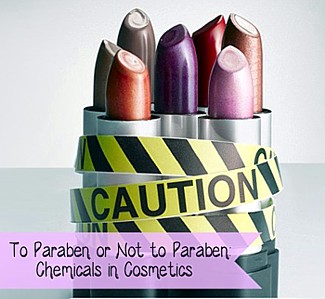Weighing The Benefits Of Using Cosmetics With Natural Preservatives vs. Synthetic Parabens
 November 29, 2013
November 29, 2013  Kyriaki (Sandy) Venetis
Kyriaki (Sandy) Venetis  Image courtesy of beautiful-solutions.co.uk.
Image courtesy of beautiful-solutions.co.uk.
We hear a lot about parabens today, but what are they, and why are people making such a big deal about them?
Parabens are among the most commonly used preservatives in cosmetics and personal care products, according to the U.S. Food and Drug Administration.
Parabens are used in things like makeup, moisturizers, hair care products, and shaving products. These preservatives are used in cosmetics products to prevent bacterial and fungal growth.
Chemists Corner explains how contamination can occur, saying that, “Cosmetics are often stored in the bathroom, where the environment is warm and moist,” adding that skin also carries an abundance of microorganisms which can contribute to contamination.
Chemists Corner adds that cosmetics, which contain water, oils, peptides, and carbohydrates are “a very good medium for microbes,” and all these factors can contribute to product spoilage and potential skin infection.
Chemists Corner also gives its comparative view (from an industry perspective) on some of the differences between natural and synthetic preservatives, saying:
Among the most effective natural preservatives are essential oils and various herbs such as rosemary, clove, thyme, cinnamon, tea tree, lavender, neem, grape seed, etc., which are more organism specific than their synthetic counterparts.
This means they (natural preservatives) may be effective against one organism, but not another. They must be carefully blended to create a synergistic effect against a range of organisms.
The subject of natural preservatives is one that probably has more academic interest than practical or economic virtue because cosmetic preservatives have to fight a broad range of microbes. However, natural preservatives do give a wonderful marketing angle.
There’s definitely industry bias here, but a lot of truth too. Cosmetic Test Labs also did a comparative study, again finding more benefits to synthetic over natural preservatives.
The lab listed among the benefits of synthetic preservatives as: having a broad-spectrum of activity against bacteria and fungi; being consistent from batch to batch; having relatively low cost; requiring low concentrations to effectively preserve products; and generally not interfering with fragrances, lather, color, or other aspects of a given formulation.
The lab listed drawbacks of synthetic preservatives including that they are often petroleum-based; some consumers find them irritating to the skin; and they may require a narrow pH range to be effective.
For the benefits of natural preservatives, the lab only listed their ability to “function over a broad pH range to be effective.”
